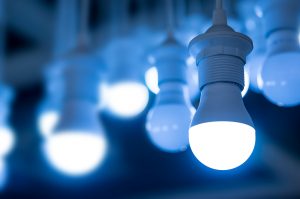VAEEC Formally Intervening in Support of Efficiency Programs in Dominion DSM Proceedings before the SCC
 In October 2018, Dominion Energy proposed eleven new Demand-Response (DR) programs, ten of which are for energy efficiency, as part of their ten-year commitment to energy efficiency programs under the Grid Transformation and Security Act of 2018 (GTSA). The application totals $225.8 million of the $870 million committed under the GTSA, and includes six residential programs and five non-residential programs:
In October 2018, Dominion Energy proposed eleven new Demand-Response (DR) programs, ten of which are for energy efficiency, as part of their ten-year commitment to energy efficiency programs under the Grid Transformation and Security Act of 2018 (GTSA). The application totals $225.8 million of the $870 million committed under the GTSA, and includes six residential programs and five non-residential programs:
- Residential
- Appliance Recycling Program: would incentivize consumers to recycle eligible freezers and refrigerators.
- Home Energy Assessment Program: would facilitate a walk-through energy assessment and incentivize efficiency upgrades based on the findings.
- Smart Thermostat Management Program (DR): would provide consumers who already have an eligible smart thermostat an annual incentive to enroll in a peak demand response program.
- Smart Thermostat Management Program (EE): would provide a one-time rebate for customers who purchase an eligible smart thermostat.
- Efficient Products Marketplace Program: would establish a rebate program for qualified efficient products purchased through participating retailers or an online marketplace.
- Customer Engagement Program: would provide consumers with energy use data and energy saving suggestions.
- Non-residential
- Heating and Cooling Efficiency Program: would provide an incentive to qualifying customers to implement high efficiency heating and cooling technologies.
- Lighting Systems & Controls Program: would provide an incentive to qualifying customers to implement efficient lighting technologies with verifiable savings.
- Window Film Program: would incentivize customers to install solar reduction window film.
- Office Program: would offer incentives for installation of a variety of energy efficiency measures related to building systems to small office facilities.
- Small Manufacturing Program: would offer incentives for installation of a variety of energy efficiency measures to small manufacturing companies, primarily regarding compressed air systems.
If you are a VAEEC member, be sure to sign up for our webinar on March 5th for a deeper dive into the filing and a tutorial on how to prepare your own comments on these programs.
VAEEC has once again formally intervened in support of these programs in the proceeding before the State Corporation Commission (PUR-2018-00168) with Rachel Gold from the American Council for an Energy-Efficiency Economy (ACEEE) acting as our expert witness. We have again retained counsel from the UVA Environmental and Regulatory Law Clinic in support of the Company’s application.
In our pre-filed testimony, we provided strategies to improve the overall portfolio, provided analysis of the Company’s spending on EE programs as compared to other utilities in their peer group, and their progress towards spending $870M.
As part of our testimony, ACEEE performed a gap analysis to determine what other programs should be included in future DSM filings to reach $870M. This gap analysis identified five major program areas for future inclusion: Multi-Family, New Construction, Commercial & Industrial, Strategic Energy Management, and Midstream programs. These suggestions are listed in more detail on page 19 of our pre-filed testimony.
Our testimony includes additional analysis of Dominion’s spending on EE programs as compared to other utilities in their peer group, which is a group defined by the SCC. This group consists of six other southeastern utilities, including Duke Energy, APCo, and South Carolina Electric and Gas. According to that analysis, only the last two utilities listed spent less than Dominion on energy efficiency programs as a percentage of revenues in 2017, indicating that there is ample room for program expansion and a strong feasibility in meeting the $870M commitment.
Additionally, we do not support the Company’s inclusion of lost revenues in the $225M spending cap for energy efficiency programs since they are not costs associated with these specific programs. As stated in Ms. Gold’s testimony, “Lost revenue is not a cost of energy efficiency for the simple reason that these revenues still exist and are recovered by the utility from customers, even without any efficiency programs at all.” Including lost company revenues in the spending cap greatly reduces the amount of spending on actual energy-saving programs that benefit both the consumer and the companies that provide those services.
Finally, our pre-filed testimony also provided suggestions to maximize the effectiveness of the stakeholder process that was established under the GTSA last year. Building on the Stakeholder Framework VAEEC created last year in partnership with other groups like ACEEE, our testimony recommends setting clear objectives for the stakeholder group, focusing on three main areas: program design, evaluation, and policy. We also make recommendations based on the successful passage of SB 1605 and HB 2293, which will clarify the duration of the stakeholder process in addition to providing accountability measures for the group itself.
While our testimony has been filed, there is still ample time for non-intervenors to participate. The timeline below highlights some key dates, including due dates for written and oral public comments. We hope you will sign up for our webinar on March 5th to learn how to prepare your own comments for submission.
Timeline
February 15th: SCC Staff report due
March 5th: VAEEC members-only webinar, featuring Rachel Gold from ACEEE
March 13th: Written public comments due
March 20th: Proceeding before the SCC Commissioners, including public testimony
Late May/ Early June: SCC Final Order
Sign up today for our March 5th webinar!
If you are interested in researching further into this filing, you can use the search feature on the SCC website to read through public documents in the proceeding. Make sure to use the case number, PUR-2018-00168.
